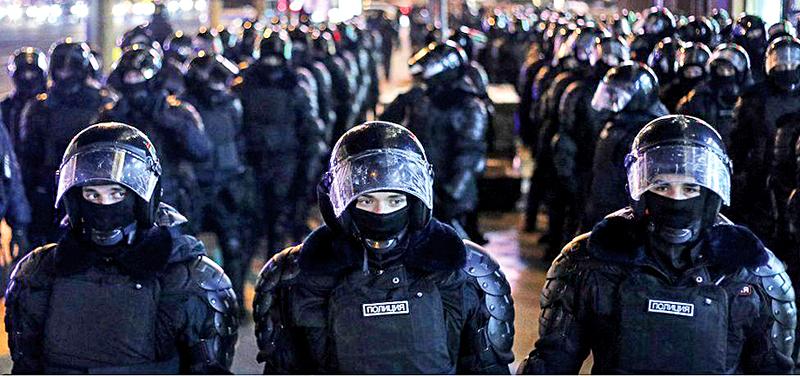
When long rows of riot police took up positions in central Moscow on Tuesday evening, the message was clear: all protests in support of opposition leader Alexei Navalny would be crushed.
For the next few hours, those who dared to test the authorities’ resolve were chased through the streets. Images of arrests - police batons flying - were soon being streamed live online.
The scenes came just hours after a judge ruled that Russian President Vladimir Putin’s fiercest critic would spend the next couple of years behind bars.
Navalny denounced the hearing as a show trial meant to “scare millions” and quash dissent.
But muzzling him and his message may not be as easy as the Kremlin hopes. “I think it’s only the beginning of problems for the regime, because Navalny became not only a political force but a moral one, which makes him more attractive to those who weren’t previously his followers,” argues Andrei Kolesnikov, of the Moscow Carnegie Centre.
“It’s not just the political opposition, but civil society that’s irritated by the cruelty - the behaviour of the police and the courts.”
The Kremlin has long painted Navalny as an “agent” of the West bent on undermining Russia, whilst insisting that the courts are entirely independent and that angry protesters are “hooligans”. President Putin’s spokesman has praised the security forces for coming down “hard” on “provocateurs”.
But some here warn that the tough tactics could backfire.
“The crackdown on Alexei Navalny, which is shocking in its cruelty… is also shockingly foolish,” wrote Filipp Styorkin for the independent VTimes website.
He argues that Navalny’s prison sentence will fuel further protest, not stop it. Not ideal for the Kremlin in uncertain economic times.
“The authorities persistently saw into the legs of the chair they’re sitting on, even though the chair looks increasingly flimsy as it is,” Mr Styorkin said.
Many at street rallies do say they are protesting for the first time, and less for Alexei Navalny than against the harsh way he has been treated.
On Tuesday evening, after the court hearing, drivers in central Moscow hooted their horns in solidarity with those protesting - still too nervous to stop and join in, but a hint that frustration could be widespread.
That includes anger at the high-level corruption that Navalny’s investigations have exposed: especially galling as Russians have seen their own lives get tougher.
There is some discussion here about how popular the Kremlin’s uncompromising stance might be amongst senior officials, as Western governments consider new sanctions: asset freezes and travel bans are an acceptable price for a patriotic project like “returning” Crimea, but targeting an opposition politician may be a less popular cause.
It’s not yet clear how long this wave of protests might last.
They may well subside until the next likely flash point - parliamentary elections in autumn, when Mr Navalny had plans to “decimate” the pro-Kremlin United Russia party at the polls. – AFP
